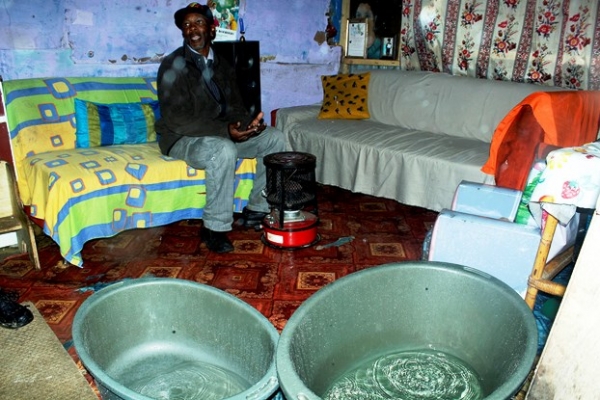Imizamo Yethu residents brace for cold winds and heavy rains

Richard Ngcongolo is one of thousands of informal settlement residents across Cape Town whose homes are left waterlogged by heavy rainfall during the winter months. Ngcongolo, a resident of Imizamo Yethu in Hout Bay, huddles around a small paraffin heater while three large plastic buckets fill with water dripping through the roof of his two-room shack.
“I change these buckets four or five times a day when they get full,” he says. “When it rains the water runs down the walls and onto the furniture. Everything in my house gets wet.”
Disaster Risk Management Centre spokesperson Charlotte Powell said several informal settlements were assisted with blankets, warm food and alternative accommodation on Tuesday.
“We have received numerous reports from people in waterlogged informal settlements in Gugulethu and Site C Khayelitsha, where some residents had to be relocated to a local creche. Officials have been sent out to Imizamo Yethu, but we are still waiting on a report,” she said.
Ngcongolo shares his home with six relatives. Winter, he says, is a tough time for his family. “I can’t do anything during the day, because I have to make sure the buckets don’t overflow into the house. Some of the children sleep on the couch, but when it’s wet, they have to sleep there, because there will be water on the floor. If we could just get some help, it will be better.”
A woman walks up a flooded path during heavy rains in Imizamo Yethu, Hout Bay. Photo by Masixole Feni.
Ngcongolo says one of the central electricity boxes had short circuited on Monday, leaving dozens of residents without power.
“This gets worse still as winter comes. But what can we do?” he asks.
Another resident, 74-year-old Elsie Tafeni, was busy making food when GroundUp arrived. Her daughter, Ntombozuko, pointed out that while her mother had not left the shack her top was damp from water leaking over her bed.
“I’ve been living here the longest, for over 20 years, but I still don’t have a [formal] house. We can’t live like this. We really need blankets and plastic covers for the roof to stop the rain from dripping through the holes. We don’t know what to do anymore,” she said.
Resident Miriam Malgas said, “The council promises that they will improve services and help us, but we haven’t seen anything yet. The government built houses for us, but younger people who haven’t lived here [as] long received those places.”
Elsie Tafeni, a 74-year-old granny, shows how her shack is leaking in Imizamo Yethu, Hout Bay. Photo by Masixole Feni.
In a statement released last week, the City of Cape Town said it will be implementing its annual winter plan in a bid to reduce the risk of flooding and damage caused by strong winds during winter.
It said that the South African Weather Services had predicted heavy rainfall until mid-September.
‘There has also been a prediction of below average temperatures up to the end of July as a result of the higher than normal rainfall expected. Apart from running public awareness sessions in high risk communities, the department also issues weather warnings and alerts based on advisories received,’ the statement read.
According to the City, various emergency shelters have been identified to accommodate residents in the event of flooding, and arrangements have been made with disaster relief partners for humanitarian aid.
The City has urged the public to report any blockages as soon as possible to 0800 65 64 63.
Imizamo Yethu, Hout Bay, during the steady rains on Tuesday. Photo by Masixole Feni.

This article is licensed under a Creative Commons Attribution-NoDerivatives 4.0 International License.


